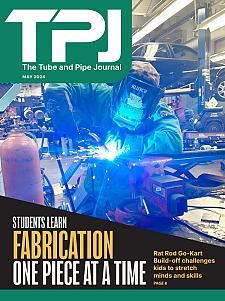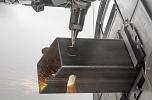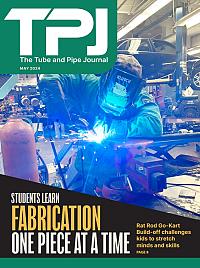Senior Editor
- FMA
- The Fabricator
- FABTECH
- Canadian Metalworking
Categories
- Additive Manufacturing
- Aluminum Welding
- Arc Welding
- Assembly and Joining
- Automation and Robotics
- Bending and Forming
- Consumables
- Cutting and Weld Prep
- Electric Vehicles
- En Español
- Finishing
- Hydroforming
- Laser Cutting
- Laser Welding
- Machining
- Manufacturing Software
- Materials Handling
- Metals/Materials
- Oxyfuel Cutting
- Plasma Cutting
- Power Tools
- Punching and Other Holemaking
- Roll Forming
- Safety
- Sawing
- Shearing
- Shop Management
- Testing and Measuring
- Tube and Pipe Fabrication
- Tube and Pipe Production
- Waterjet Cutting
Industry Directory
Webcasts
Podcasts
FAB 40
Advertise
Subscribe
Account Login
Search
The morality of metal fabrication
- By Tim Heston
- May 16, 2016
Despite manufacturing’s resurgence in recent years, which came with a noticeable image boost, when many people think about this business, they think about layoffs and plant closures—and for good reason. We read about layoffs in what are now notoriously weak sectors. The latest example is mining equipment maker Joy Global, which is closing its fabrication facility in Milwaukee.
We hear and read about the business decisions leaders make in distress, usually because it involves people losing their livelihoods. But we often don’t hear about how some companies do all they can to protect those livelihoods, both of their employees and employees at other companies.
So many fabricators have customers who also happen to be competitors. Two fab shops may bid on the same jobs, but they also may help each other out in a pinch to help through periods of peak demands. One shop may have certain capabilities that the other doesn’t
These relationships have become a lot more complex in recent years. As shops diversify their process offerings, they change the competitive landscape. Many shops strive to become a one-stop-shop for customers looking to consolidate their supply chain.
But what about those relationships with other fab shops?
Consider Richards Sheet Metal Works in Ogden, Utah. Earlier this year the custom fabricator added a massive tube cutting laser. Need to cut a round tube that’s 16 inches in diameter? This laser can handle it.
“The funny thing is that before we got into this, we used to steer customers away from tube. Now we’re steering them toward tube, if it’s a faster and more cost-effective option.”
So said Kevin Jones, the fabricator’s vice president of tube laser sales and estimating. He added, however, that as Richards’ fabrication capabilities became more diverse, managers were careful to maintain relationships with its current customers, some of which are also custom fabricators. If an opportunity will take away current work from those custom fabricators, Richards won’t pursue it.
For instance, a manufacturer may contract with one custom fabricator for sheet metal cutting and bending, then another company for tube cutting. Say that manufacturer wants to consolidate its supply chain and find one company that can do it all. Richards Sheet Metal Works could well be that company.
But what if the custom fabricator who supplies that manufacturer also does a fair amount of work with Richards? From a purely business perspective, growing at the expense of other customers may be good for the short term, but what about the long term?
Though driven to grow their businesses, shop owners also want to be fair. Custom fabricators sometimes compete, other times collaborate. But at a base level, they are part of a community, one in which business owners trust each other to do the right thing.
Especially today, that’s not something to be taken for granted.
subscribe now

The Tube and Pipe Journal became the first magazine dedicated to serving the metal tube and pipe industry in 1990. Today, it remains the only North American publication devoted to this industry, and it has become the most trusted source of information for tube and pipe professionals.
start your free subscriptionAbout the Author

Tim Heston
2135 Point Blvd
Elgin, IL 60123
815-381-1314
Tim Heston, The Fabricator's senior editor, has covered the metal fabrication industry since 1998, starting his career at the American Welding Society's Welding Journal. Since then he has covered the full range of metal fabrication processes, from stamping, bending, and cutting to grinding and polishing. He joined The Fabricator's staff in October 2007.
About the Publication
Related Companies
- Stay connected from anywhere

Easily access valuable industry resources now with full access to the digital edition of The Fabricator.

Easily access valuable industry resources now with full access to the digital edition of The Welder.

Easily access valuable industry resources now with full access to the digital edition of The Tube and Pipe Journal.
- Podcasting
- Podcast:
- The Fabricator Podcast
- Published:
- 04/16/2024
- Running Time:
- 63:29
In this episode of The Fabricator Podcast, Caleb Chamberlain, co-founder and CEO of OSH Cut, discusses his company’s...
- Trending Articles
3D laser tube cutting system available in 3, 4, or 5 kW

Corrosion-inhibiting coating can be peeled off after use

Zekelman Industries to invest $120 million in Arkansas expansion

Brushless copper tubing cutter adjusts to ODs up to 2-1/8 in.

HGG Profiling Equipment names area sales manager

- Industry Events
16th Annual Safety Conference
- April 30 - May 1, 2024
- Elgin,
Pipe and Tube Conference
- May 21 - 22, 2024
- Omaha, NE
World-Class Roll Forming Workshop
- June 5 - 6, 2024
- Louisville, KY
Advanced Laser Application Workshop
- June 25 - 27, 2024
- Novi, MI


























